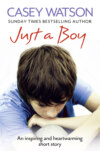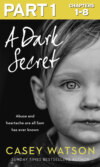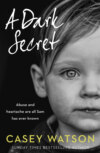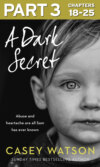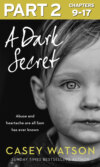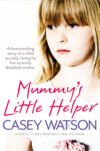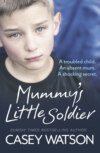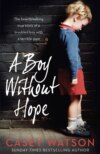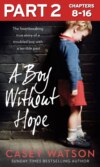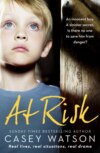Loe raamatut: «Just a Boy: An Inspiring and Heartwarming Short Story»
Copyright
This book is a work of non-fiction based on the author’s experiences. In order to protect privacy, names, identifying characteristics, dialogue and details have been changed or reconstructed.
HarperElement
An imprint of HarperCollinsPublishers
1 London Bridge Street
London SE1 9GF

and HarperElement are trademarks of
HarperCollinsPublishers Ltd
First published by HarperElement 2013
FIRST EDITION
© Casey Watson 2013
Casey Watson asserts the moral right to be identified as the author of this work
All rights reserved under International and Pan-American Copyright Conventions. By payment of the required fees, you have been granted the non-exclusive, non-transferable right to access and read the text of this ebook on-screen. No part of this text may be reproduced, transmitted, down-loaded, decompiled, reverse engineered, or stored in or introduced into any information storage and retrieval system, in any form or by any means, whether electronic or mechanical, now known or hereinafter invented, without the express written permission of HarperCollins ebooks.
Find out about HarperCollins and the environment at
Ebook Edition © May 2013 ISBN: 9780007529353
Version 2016-10-21
Contents
Cover
Title Page
Copyright
Dedication
Just a Boy: An Inspiring and Heartwarming True Story
Exclusive preview of Casey’s next title Breaking the Silence
Sample from Casey’s heart-rending debut title The Boy No One Loved
Sample from Casey’s shocking 2nd book Crying for Help
Sample from Casey’s 3rd harrowing memoir Little Prisoners
Sample from Casey’s poignant 4th title Too Hurt To Stay
Sample from Casey’s latest inspiring true story Mummy’s Little Helper
Casey Watson
Acknowledgements
About the Publisher
Just a Boy
Kindness is a language which the deaf
can hear and the blind can see.
Mark Twain
Dropping my shopping in the hall, car keys hanging from my mouth, I ran through the house to get to the phone before it cut off.
‘Hello,’ I spluttered, trying to catch my breath.
‘Casey, hi there,’ said a familiar voice. It was John Fulshaw, my fostering-agency link worker. ‘You sound puffed,’ he observed. ‘Are you okay to talk?’
‘To you?’ I replied, laughing. ‘Anytime. Do you bring me good tidings?’ I felt a ripple of excitement about why he might be phoning. Mike and I were between placements at the moment, a state of affairs I became bored with very easily. Perhaps John had a new child for us. Now that would really make my Wednesday. ‘Well?’ I finished.
‘Yes,’ he said. ‘I do.’
I was just about to ask him for chapter and verse when he continued. ‘But only of a temporary nature. It’s a fourteen-year-old boy who lives with his elderly grandparents and needs a place to stay just for a couple of days.’
He went on to explain that this boy, who was called Cameron, wouldn’t be one of our usual kind of children, who mainly came from terrible backgrounds or were already in the care system. This was different. It was a lad who lived in perfectly agreeable family circumstances and who needed a place to go only because his grandmother had been taken ill and hospitalised. Apparently, Granddad, who was disabled, wouldn’t be able to manage on his own, which was why a place needed to be found right away. He also needed to be able to spend time with his sick wife, John finished, and obviously couldn’t be in two places at once.
‘And our lad’s a bit too much of a handful to be home alone then, is he?’ I chortled. I knew what fourteen-year-old boys could be like.
‘Not at all,’ John corrected me. ‘Quite the opposite – he’ll be no trouble at all. There’s just one thing you need to know, really. He’s blind.’
For the first time in my life, I think, I was completely lost for words. I tried to recall if I’d ever even met anyone who was blind before, and couldn’t, and then, of course, my brain starting whirring. What would it be like, having a blind child living with us? Would it be difficult? Would we need to move the furniture?
‘Casey?’ John prompted, obviously mistaking my logistical musings for reluctance. ‘Don’t feel obliged to say yes to this. We can ask someone else, I just thought you might be interested. I know you’re itching to get another child in and I thought this might make an interesting stop-gap for you both. He’s a lovely lad – really funny and doesn’t let his disability faze him. Do you want some time to talk it over with Mike?’
‘God, no,’ I reassured him. ‘Mike will be absolutely fine with it. I don’t need to ask him because I know he’ll say yes.’
‘Well, if you’re sure …’ John said. ‘It would only be from tomorrow to Saturday morning. There’s a family member travelling up to take over then, I believe, and –’
‘Sure I’m sure,’ I told him. So that was that.
As I expected, Mike wasn’t fazed in the least. By the time he’d got home from work that afternoon, I’d already been busy on the internet, fact-finding. And it had been really useful. Taking inspiration from the website of a school for the blind, with their sensory rooms, musical instruments, interactive and soft play areas, I already had lots of ideas.
Mike seemed to find all this amusing. ‘Soft play areas?’ he asked. ‘You said the lad was fourteen, didn’t you? Not four! And if he’s been blind from birth [something else I’d managed to clarify] I expect he’s capable of a lot more than you think. Still,’ he mused, looking around him, ‘it does make you think, doesn’t it? He’s obviously familiar with his own surroundings but I reckon it will still be pretty challenging to navigate himself around here.’ He closed his eyelids. ‘And it’ll certainly be an eye-opener for us, eh?’
Mike’s lame jokes aside, I felt quite excited about the following morning, and also a bit more prepared, having spent half the evening doing more research and finding out that, contrary to what I’d always thought, many blind people could see at least some things; could often distinguish daylight from night-time, and see blurry outlines of objects and people. So my idea of perpetual darkness wasn’t correct at all. And I was about to learn more. I couldn’t wait.
It seemed as if the weather was on my wavelength as well. Thursday morning dawned to match my mood – sunny and expectant. It seemed the British climate had, for a change, decided to be kind. It was mid August and for almost the first time that month, it seemed to be in accord with everyone’s seasonal expectations.
‘Uh-oh,’ said my grown-up son Kieron as he came down to the kitchen. ‘Do I smell bleach? Honestly, Mother, at this time?’ He did. I was on my hands and knees, giving the floor a last once over. We had a dog – Bob – and I was conscious that with a visitor coming to stay, mucky paw marks were a no-no, even if the visitor couldn’t see them.
Kieron stepped over me to get to the cereal cupboard. He had a busy day planned, going off with a mate of his to pick an amp up from some far-flung location; Kieron was in college, but had being earning a few quid over the summer DJing and was doing a disco at the local youth club on Friday night.
‘You do,’ I said, ‘and talking of smells, can you do me a favour? Can you nip out to the garden before you go and pick what you can find for me, flowers-wise?’
It would be nice, I thought, bearing in mind what I’d read about sensory-impaired people relying more on their other senses, to have the place smelling nice for Cameron’s arrival.
Kieron duly did, and, in fact, still hadn’t left when the car containing Cameron pulled up outside. Though not with John – there was no need for John to be involved in this handover. There’d be no reams of paperwork, no ominous-looking manila files to be gone through; just a quick chat with Cameron’s social worker, Jeremy.
I went to the front door and opened it ready, taking stock as the two of them approached. It felt a little weird watching someone so intently when they couldn’t see you, but my eyes were drawn to him as if by a magnet. He was a tall lad – he looked more like sixteen or seventeen than fourteen – and good-looking, too, with a shock of conker-coloured hair. I noticed straight away that he walked without the aid of his social worker and instead had a white cane that snapped into life when he shook it, and sort of hovered, just above ground level, swinging left and right in front of him, as he deftly made his way to our door.
I didn’t know what he could see of me, but Cameron had a huge smile on his face, and appeared to be looking just above my head. This was no surprise really, given the difference in our height. I’m four foot eleven, and this kid had to be six feet tall. I was just about to say hello when I almost jumped out of my skin. Out of nowhere, this robotic-sounding voice had suddenly spoken. ‘Good morning,’ it said. ‘It is 10.00 a.m.’
Cameron laughed and turned his head. ‘That’s a fiver you owe me, Jezza,’ he said to his social worker. ‘Told you we wouldn’t be late, didn’t I?’
Jeremy seemed amused by my startled expression, ‘Talking watch,’ he said by way of explanation. ‘We had a bit of a bet on the way over, because I was getting in a bit of a fluster about being late, and Cameron – he’s a bit of a whizz with numbers, aren’t you, Cameron? – had a wager with me. And it looks like he won.’ He grinned at his charge. ‘But it was for a cream cake, not a fiver. Bit of a chancer, this one,’ he chuckled.
I shook Jeremy’s hand. ‘Come on in,’ I said.
‘And mind the step!’ Kieron added. He and Bob were now just behind me, having obviously come to say hello.
‘Oh, that’s okay,’ Cameron shot back, deftly crossing the threshold unaided. ‘My stick has built-in radar so I knew about that step a few inches before I touched it.’
Kieron and I looked at each other and I was just about to say something dumb when Cameron added, ‘That was a joke, by the way.’
It set the tone perfectly, and it was with jovial spirits that we had our mini-meeting. It seemed Cameron did have some basic vision – dark and light, some fuzzy shapes and muted colours – and, between them, he and Jeremy explained the practical things about safety, as well as what Cameron liked to eat and ‘watch’ on TV. This surprised me. It never occurred to me that a blind person might enjoy television, but apparently he did, very much so. In fact, it turned out he was a whizz with a TV remote, and showed me something I’d never realised; that there was a reason for the little knobble on the number five button – it was the point visually impaired people could navigate from. There was even such a thing as ‘audio description’, which I’d also never heard of – some programmes had a narrator describing the scenes as they occurred to make it easier to picture as you listened to the programme. Amazing! I thought.
Tasuta katkend on lõppenud.

